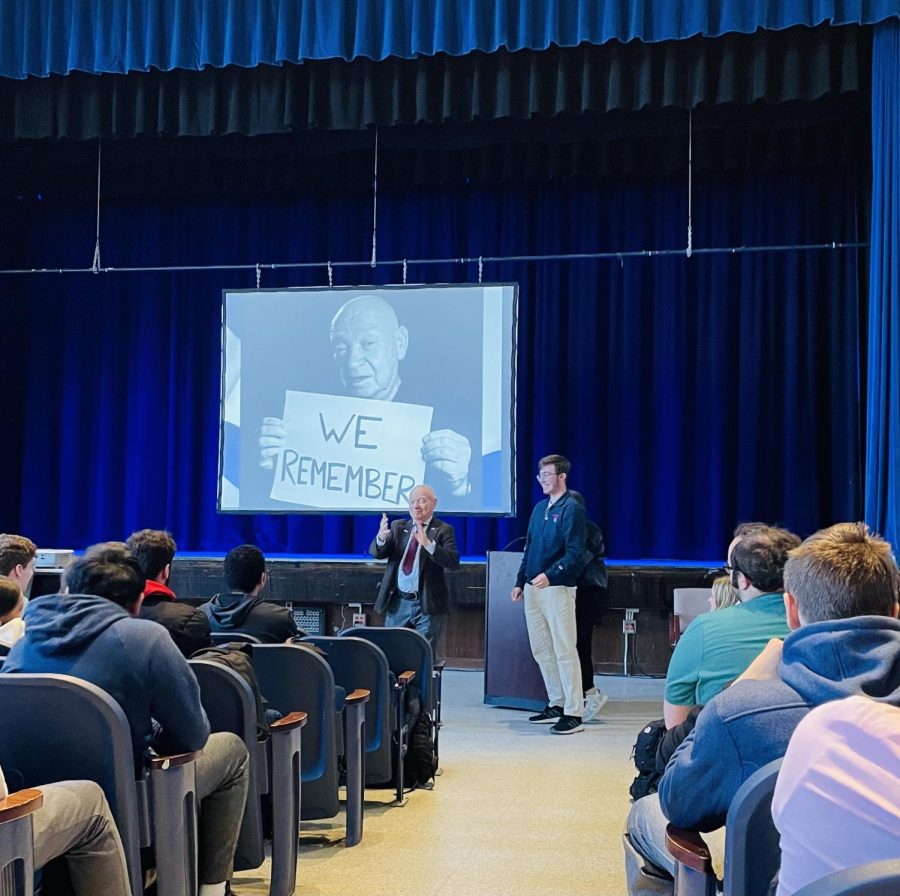Holocaust Survivor Sami Steigmann speaks at WHS
Photo photo by Hi’s Eye staff
Holcaust Speaker Sami Steigmann at the assembly on April 20
WHS had the honor of hearing from Holocaust survivor Sami Steigmann during a schoolwide assembly on April 20. Working alongside Kean University’s Holocaust Resource Center, the Jewish Cultural and Devlopment Club invited Steigmann to educate students on the impact of antisemitic hate. This assembly comes three weeks after another swastika was discovered in a WHS bathroom.
Steigmann was born in what is now Ukraine and was sent to the Mogilev-Podolsky labor camp in 1941. Too young to work, Steigmann was subjected to Nazi medical experimentation. While he has no recollection of his time in the labor camp, to this day, Steigmann suffers from pain caused by the experiments. He received financial compensation for related medical expenses from the German Government’s Claims Conference Compensation program after they found documentation of Nazi medical abuse. Steigmann said the “acknowledgment of [his] suffering was more valuable than any dollar amount.”
After being released from the labor camp in 1944, Steigmann went on to live in Transylvania and then Israel in 1961. He emphasized how the “emotional baggage [his] family carried prevented [him] from having a normal childhood.”
Steigmann came to the U.S. in 1968 by himself without money and without knowing how to speak English. Now an established motivational speaker, Steigmann travels across the globe to share his story.
Using the acronym EMET (Educate, Motivate, Empower, Teach Tolerance), which means truth in Hebrew, he hopes to spread messages of inclusivity and acceptance. However, his commitment to tackling bigotry and discrimination is met with resistance. Back in 2015, the Jersey Journal published an article referring to Steigmann as a “Jew Holohoaxer.”
Steigmann responded to the incident with positivity, insisting that “people only hate someone because they don’t know them, which is why we need to treat people as individuals, not as groups.”
Steigmann’s story was well-received among faculty and students alike. Freshman Emily Gasson said “It was really inspiring that despite all Sami has been through and all of the pain he still experiences to this day, he’s able to spread a message of making a difference even when you don’t think you can.”
Junior Sophie Braun, who is active in the No Place for Hate Club, said, “It is extremely important to tell the stories of Holocaust survivors and I am honored that WHS had the privilege of hearing Sami’s testimony. Conversations on topics related to antisemitism are difficult. I hope that this is just a starting point for normalizing discussions about antisemitism to create a more accepting school community going forward.”
History Teacher Kim Leegan, who helped organize the assembly, echoed this sentiment and expressed her gratitude. “With so few living Holocaust survivors, it is simply a gift to be in the same room with one,” she said. “Throughout the day I heard students and staff talking about things they learned or something Sami said or asking questions and expressing disappointment that we did not have more time to spend with him. This tells me that Sami’s message of educating ourselves and being a change agent resonates with many people. I call that success.”
The positive reception of Steigmann’s presentation is promising given the crucial role young people play in combating intolerance. As Steigmann said, “All of the changes in the world happened with the young people. My hope is on you.”

